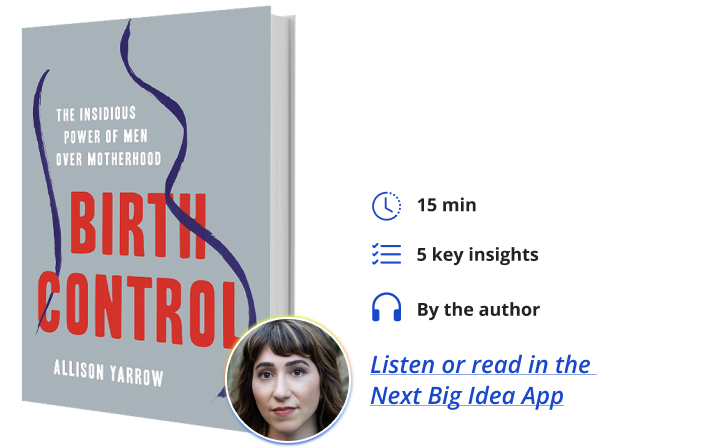Allison Yarrow is an award-winning journalist and speaker. She was a National Magazine Award Finalist, a TED resident, a producer at NBC News and Vice, and a reporter and editor at Newsweek and The Daily Beast.
Below, Allison shares 5 key insights from her new book, Birth Control: The Insidious Power of Men Over Motherhood. Listen to the audio version—read by Allison herself—in the Next Big Idea App.

1. Birth and how we become parents in America is broken.
Growing and birthing new life is the most powerful, seemingly magical thing humans do! It’s beautiful, spiritual, and vitally important. However, the fullness of this beauty and power isn’t being realized for the four million Americans giving birth each year.
In fact, birth has become more risky. Maternal mortality in the U.S.—already the highest in the developed world, has more than doubled in two decades to the highest rate in many of our lifetimes. More than 45 percent of people describe their births as traumatic. Women aren’t getting the support they need postpartum—from mental health screening and treatment, to assessments to ensure their bodies are functioning properly. Ninety-nine percent of people give birth in the hospital, most leave 24 to 48 hours later, and the next time they see their doctor or midwife is six weeks after that. That’s far too long. Twenty-five percent of people go back to work just two weeks after giving birth. We need to fix how birth happens.
2. It’s not our fault.
The headlines would have us believe that it is women and birthing people themselves to blame for the maternal mortality and mental health crises. They cite obesity, underlying conditions, older mothers, Covid, and lack of access to care. But these “causes” blame mothers themselves when the blame lies with the hospital system. Where and how birth is happening have not been examined, or hardly changed at all, in decades. When I surveyed 1,300 mothers about their birth experiences, I learned that many had suffered injuries or trauma during birth. They had also internalized the belief that it was their own fault. It’s not. The hospital systems pushing profits are to blame.
“The blame lies with the hospital system.”
When America was founded, Black and indigenous midwives attended births in homes, and studies show they had very good results. What this meant was that care for this physiological process came down to the people doing it. Pregnancy, birth, and postpartum care can meet mothers where they are. Literally.
3. Birth is an individual experience that needs individual care.
Hospitals use a managed care model for birth. That means care for many women in labor, by few providers. When women arrive at a hospital in labor, they are admitted only after a routine pelvic exam, followed by electronic fetal monitoring so that many labors can be watched at once remotely, then administered synthetic oxytocin to start or speed up contractions, making them far more painful. Then, if she’s taking too long, or it’s dinner time, surgery.
This progression is called the cascade of interventions. None of it is based on evidence, but on tradition, and it’s because hospitals are incentivizing income over quality of care. The faster birthers are moved through the hospital, the more money is made in a managed care system. This model doesn’t serve women or families, nor does it keep people safe. It actually introduces many risks with each new unnecessary intervention. It unnecessarily turns normal birth into an emergency for profit. It’s directly connected to birth trauma and postpartum mental health conditions. It is the opposite of individual care.
4. The person giving birth is the expert in her body.
The obstetrician Robert Bradley grew up on a farm watching all manner of animals birth their young. He famously observed that birthing bodies require six things: darkness, controlled breathing, closed eyes, quiet, physical comfort, and relative solitude. Without these requirements, birth stalls or halts.
What he’s getting at is that birth doesn’t work on a clock. It is a process in the body, not the procedure in the hospital that it has become. It needs time, personal attention, dignity, and respect. It needs to be safe and empowering.
“Birth doesn’t work on a clock.”
The midwife’s model of care views birth as a physiological process and centers the person doing it as the expert. The research shows this model produces the best outcomes for moms, babies, and families. Mothers prefer it, and with it, they are less likely to experience interventions including Cesareans, episiotomies, third- and fourth-degree perineal tears, maternal infection, postpartum hemorrhage, and “untoward birth outcomes.”
It can also be practiced anywhere—at home, in hospitals, and in birth centers.
5. Birth affects everyone: We’re all born!
People who are pregnant or want to be must understand the mainstream, managed care system of birth so they can make a plan, choose providers that center them, and keep themselves safe. Those who have given birth before, and were traumatized, injured, or whose experience wasn’t what they expected, deserve validation.
Also, doctors, midwives, nurses, doulas, and healthcare heroes who take care of pregnant people deserve more support. People who won’t give birth like men and child-free folks probably love someone who has or will give birth. They can support them by listening, reminding them that they are the expert in their own body and care, and questioning their own biases about birth. Everyone benefits when our family creation is empowering and safe.
To listen to the audio version read by author Allison Yarrow, download the Next Big Idea App today:
































